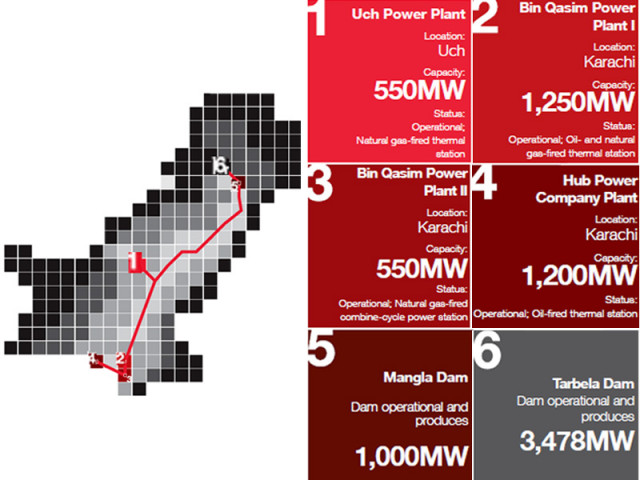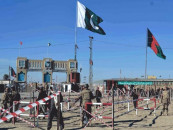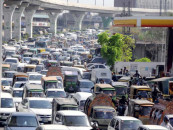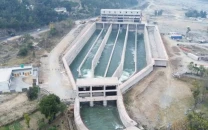Sunday’s power fiasco: What went wrong?
Rs 3 billion in power sales was lost on Sunday during the blackout.

Four-member inquiry committee formed as experts warn govt decision to avoid load shedding ahead of elections will cost the entire system. DESIGN: FAIZAN DAWOOD
There is a big screen at the National Power Control Centre that is constantly monitored. And on Sunday night as soon as the Uch power plant dropped below 550MW, someone should have noticed.
Distributors should have been told to cut off supplies to ‘unimportant’ consumers so demand was lowered. This did not happen. The result was a domino effect of tripping. Think of what happens when you turn the AC on when the generator is running. The demand was not lowered and the burden was passed on to Karachi which tripped, followed by Hubco, then Tarbela and Mangla.
“Right now the country is not following any load management plan and therefore the National Power Control Centre (NPCC) had no exact idea how to ask distribution companies to reduce the stress on the system,” explained an official of the water and power ministry.

A load management plan would have meant a load shedding schedule and those are vastly unpopular with voters. In fact, after the blackout the prime minister approved Rs40 billion for oil and gas suppliers so power plants work at full capacity. The plan is to keep load shedding to a minimum as elections are around the corner.
“The government does not want to upset voters so there are no planned outages to manage the electricity shortage,” said an official who has held key ministry positions. “[Sunday] was bound to happen. You can’t keep people happy with an uninterrupted power supply when surrounded by so many problems.”
And this problem is not going away: 7,500 megawatts (MW) are produced but the country needs double or 13,500MW. A load management plan should have been in place or in the very least, an SOP for the emergency that developed Sunday.
It appears that the person who is in charge didn’t know what to do. The man who was called in to fix the problem was Chaudhry Masood, who has just retired as the NPCC general manager and is now a consultant. “Masood was called in for help to fix the system last night” an official said. They never found a good enough replacement for him.

The NPCC isn’t the only cog in the machine that has suffered from a lack of competent management. In the last four and a half years, six secretaries linked to the power sector - the top most official after a minister - have been changed. The seventh, Rai Sikandar, replaced Nargis Sethi a few days back.
Power firms come under the administrative control of the water and power ministry. But instead of having experts head these organisations, ministry officials run them. For example, Deputy Secretary Mussadiq Ahmad Khan is looking after the National Transmission and Despatch Company (NTDC), the power ministry’s special secretary Himayatullah Khan looks after the Central Power Purchasing Agency. Zargham Ishaq Khan, a joint secretary, runs the Pakistan Electric Power Company. They are paid by the government and the companies. The power distribution companies from Gujranwala to Quetta are also being run by temporarily appointed bureaucrats.
Despite this shaky set-up, the government was quick to blame the privately run Hub Power Company for the disaster Sunday. But its CEO, Zafar Iqbal Sobani, said they had rung the alarm. “We had informed the NTDC,” he told The Express Tribune. “We told them that [they had] to bring up that level,” he said referring to how the load frequency had dropped to 48.5 hertz, below the normal 50 hertz on the national grid because of the shortage.

And thus it appears that even the NTDC is to blame along with the NPCC. Energy expert Arshad Abbasi said that organisations like the NTDC should always be governed by professionals and not bureaucrats. “I think it is a conspiracy to lead Pakistan to a collapse through energy collapse,” he said. Sunday’s breakdown was caused by poor management and bad governance in the power sector.
“If there was something wrong with one power plant then only a certain area should have been affected,” added Najamul Hassan Farooqi, an energy consultant. “The NTDC should have contained the fallout. They could have stopped the load from being transferred onto the entire system.”
For whatever it is worth, a committee has a week to make an inquiry. The committee consists of a member of Wapda, the NTDC technical director, chief engineer for system protection and the joint secretary of the power ministry. The prime minister was informed that the breakdown was caused by a “technical fault”. Perhaps human lack of planning would be more appropriate.
Published in The Express Tribune, February 26th, 2013.



















COMMENTS
Comments are moderated and generally will be posted if they are on-topic and not abusive.
For more information, please see our Comments FAQ